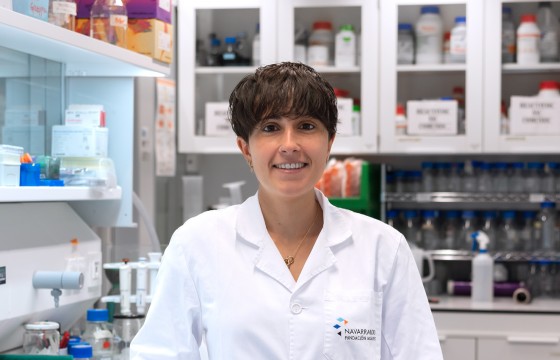
Ester Blanco Palmeiro will present her doctoral thesis on Friday, November 3rd
Ester Blanco Palmeiro, predoctoral researcher at the Oncoimmunology Unit from Navarrabiomed-IdiSNA, will be reading her thesis by the University of Navarra on Friday, November 3rd, at 10:00 am, in the auditorium of the Cima University of Navarra.
The doctoral thesis, which is entitled "Reprogramming of tumour-associated myeloid cells by immunomodulatory agents to improve anti-PD-1 therapies", has been developed at Navarrabiomed under the direction of Grazyna Kochan MD and Cristian Smerdou MD from Cima University of Navarra.
Research development and results
Therapies based on PD-1/PD-L1 blockade have shown clinical results and lasting responses, but they are not effective in a significant number of patients. Several approaches have been proposed to enhance immunotherapy. These include in particular the modulation of the tumour microenvironment by reprogramming the immunosuppressive myeloid populations that are an important component and are responsible for inhibiting the effector activity of T lymphocytes. Reprogramming towards immunogenic populations could reverse that strong immunosuppression associated with cancer.
During her doctoral thesis, the researcher has focused on identifying cancer-associated molecular signatures that are induced in these immunosuppressive populations. Using high-throughput proteomics, the phenotype and the proteome of immunosuppressive populations has been established: myeloid derived suppressor cells (MDSC) Monocytic MDSCs, granulocytic MDSCs and tumour-associated macrophages (TAMs) generated ex vivo in melanoma and lung adenocarcinoma models. With these proteomics analyses, Ester Blanco has identified their proteomic signatures. In addition, the pathways and interactomes that can be modulated to reprogram the functions of these cells have been identified.
Based on these results, compounds capable of altering the differentiation, maturation and immunosuppressive activity of MDSCs and TAMs have been selected. These compounds have been evaluated in mouse myeloid suppressor populations and cells isolated from peripheral blood of patients with non-small cell lung cancer (NSCLC). Among the compounds analysed, oleuropein was identified as a molecule capable of reprogramming tumour-associated suppressor myeloid populations towards immunostimulatory populations capable of activating T lymphocytes. In fact, its use in combination with anti-PD1 immunotherapy in a lung cancer model intrinsically resistant to immunotherapy has shown a promising anti-tumour effect.
Financing and dissemination
The research has been funded under the ISOLDA European project and resulted in several scientific publications. Ester is the co-author of 23 publications, eight original works and 15 scientific reviews. In addition, the results have been disseminated in several national and international congresses (10 communications).
It should be noted that Ester Blanco has received a travel fellowship from SETGYC to attend the ESGCT congress (Edinburgh, 2022). She was further finalist at an international congress KSMO 2022 as best oral presentation, as well as at the 3rd ASEICA Educational symposium 2021. In 2023, Ester Blanco completed a three-month stay in the laboratory of Dr Clare Bennett at the University of London, UCL, thanks to an EACR Travel Fellowships and an EMBO Short Term Fellowship.


